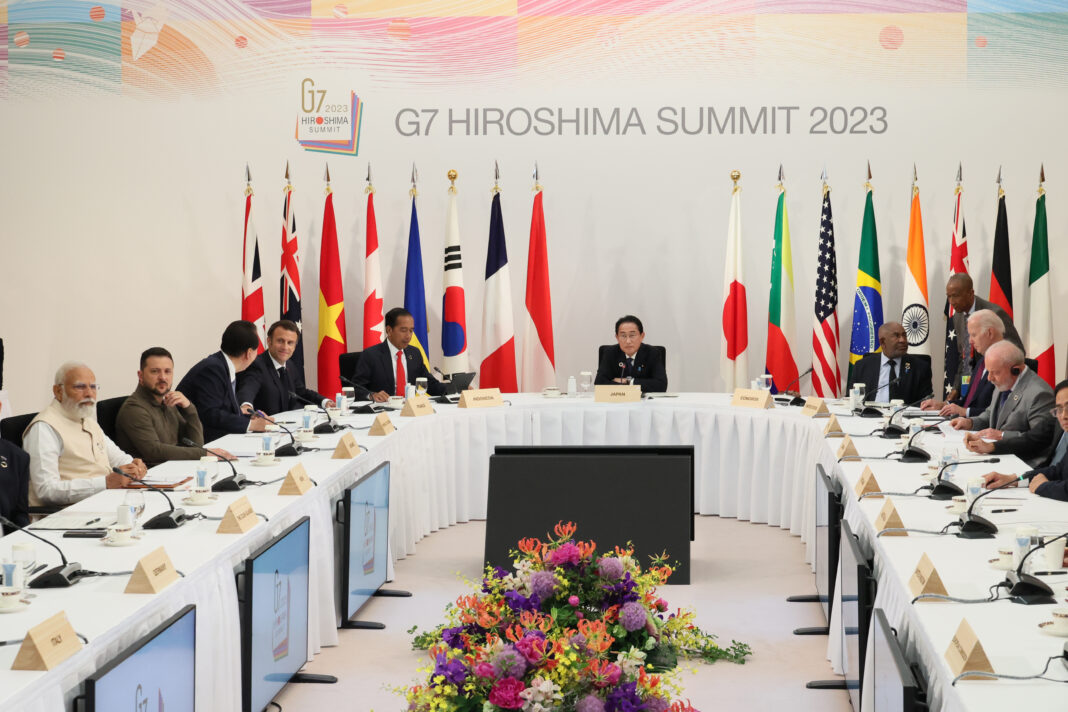Hiroshima, Japan, May 21 – The G7 Summit held in Hiroshima from May 19-21, 2023, saw leaders from the world’s leading industrialized nations gather to address pressing global issues. However, Ukrainian President Vladimir Zelensky’s hastened attendance and the ongoing Ukraine war stole the spotlight, overshadowing the summit’s agenda.
Japanese Prime Minister Fumio Kishida, the host of the summit, welcomed arriving leaders at the Hiroshima Peace Park, emphasizing the importance of nuclear disarmament and non-proliferation.
In an effort to engage with developing countries in the Global South and strengthen alliances with U.S. partners, leaders from emerging economies, including India and Brazil, were also invited. PM Kishida aimed to garner G7 support for addressing the concerns of nations in the Global South, focusing on areas such as health, food security, and infrastructure development.
However, the gravity of economic difficulties in the West and global economic challenges took a backseat as attention shifted toward the Ukrainian crisis.
President Zelensky’s hastened arrival, following Washington’s announcement of training Ukrainian pilots and allowing the supply of advanced fighter jets to Kyiv, drew condemnation from Russia but was hailed by Zelensky as a ‘historic’ move.
His subsequent one-on-one meetings with most G7 leaders resulted in promises of increased support for Ukraine, displaying a united front against Russia.
Nevertheless, the West’s ongoing efforts to rally global support against Russian President Vladimir Putin continue to face challenges. As economic difficulties persist due to the Ukraine war and subsequent Western sanctions, support for countering Putin’s actions appears to be fading.
Zelensky, ahead of his trip to Japan, accused some Arab leaders of ‘turning a blind eye’ to Russia’s invasion of Ukraine, further highlighting the complex dynamics surrounding the conflict.
At the summit, Zelensky met Indian Prime Minister Narendra Modi for the first time since the Ukraine war began. Prime Minister Modi, known for his neutral stance, reiterated support for a peaceful resolution, while Zelensky sought his backing for Ukraine’s cause.
Despite Japan’s attempt to focus on its main agenda items including denuclearization, supply chain disruptions and climate change, the Ukrainian crisis dominated discussions, preventing substantial progress on other pressing issues.
However, one key development that received less attention in the global media was the G7’s open stand against China’s “economic coercion.” The summit condemned Beijing’s alleged use of economic pressure against various countries and discussed strategies to reduce Western democracies’ economic and supply chain dependence on China.
British Prime Minister Rishi Sunak described China as the greatest challenge to global security and prosperity, highlighting its increasing authoritarianism at home and abroad.
Earlier, European Union expressed particular concern when China retaliated by blocking Lithuanian exports after the Baltic country allowed Taiwan to establish a de facto embassy.
The G7 collectively condemned what they perceived as a “disturbing rise” in the weaponization of economic vulnerabilities.
China responded fiercely to the G7’s statements, summoning Japan’s envoy and rebuking Britain for its stance.
Despite France and other EU powers’ occasional reluctance to align with the United States in containing China, the G7 underscored the West’s intentions of containing both Russia and China simultaneously.
While the G7 Hiroshima Summit showcased the West’s collective resolve to confront Putin’s aggression, the true test lies in the ability of Western powers to sustain their unity and take decisive action to effectively counter China’s economic coercion and border aggressions.






